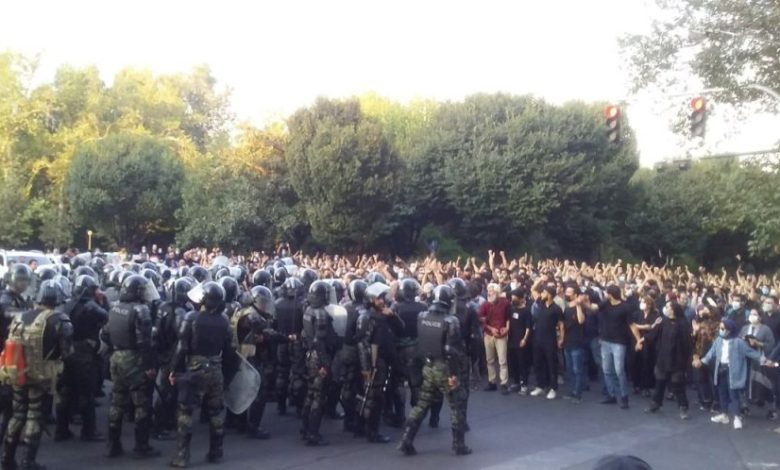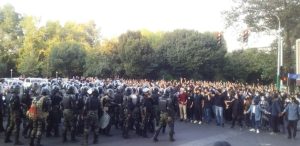Iran’s Current Uprising Has Taken Some by Surprise but Deserves Everyone’s Support

Written by
Alejo Vidal Quadras
Iran has now been undergoing a nationwide uprising for more than a month. The longevity, intensity, and scale of those protests have all seemingly come as a surprise to Western leaders, who have a long and unfortunate history of underestimating the Iranian people’s outrage and the Iranian regime’s vulnerability.
Now there are more and more policymakers and analysts in Europe and the United States who are coming around to the realization that this uprising could lead directly to a new revolution and the ouster of the mullah’s dictatorship. But questions remain about whether the European Union or its member states will actually change their foreign policy to align with this newfound recognition of the potential for Iranians to chart a new future for themselves.
It bears mentioning that some Western policymakers already recognized that potential many years ago. And if you were to ask for reactions from among them, you would find very few expressions of surprise regarding the current trajectory of developments inside Iran. For instance, a politically diverse group of Members of the European Parliament, the Friends of a Free Iran, have long advocated for more assertive Western policies on the understanding that this would assist the Iranian people in achieving their long-frustrated goal of regime change.
Recently, FoFI issued a statement, signed by more than 170 European lawmakers, which states in no uncertain terms that “the prospect of change in Iran has never been this accessible,” and that “it is time to recognize the right of the Iranian people to defend themselves and to overthrow this regime and to establish a free and democratic Iran.”
That statement recognized that the current uprising has spread to 170 cities and 45 universities in all of Iran’s 31 provinces and that the movement is being led by women and the nation’s youth. The statement also noted that “Resistance Units and the organized opposition are taking serious risks to play a vital role in organizing and sustaining these protests,” as they have done in the context of several other nationwide uprisings since the end of 2017 alone.
In January 2018, amidst the first in the still-ongoing series of uprisings, none other than the regime’s Supreme Leader Ali Khamenei acknowledged the challenges that his own regime was facing from the organized opposition, namely the People’s Mojahedin Organization of Iran (PMOI/MEK). That longstanding pro-democracy group, he said, had “planned for months” to facilitate nationwide unrest and to popularize such provocative, anti-government slogans as “death to the dictator.”
Those same slogans are being repeated even now in the context of an uprising that began with expressions of popular outrage over the death of 22-year-old Mahsa Amini at the hands of Tehran’s “morality police.” The breadth and uniformity of this messaging are indicative of the public’s appetite for regime change, as well as the opposition’s role in making each new uprising contiguous with its predecessors.
Las protestas y las manifestaciones en Irán no cejan y van in crescendo. El régimen se muestra impotente para ahogar las exigencias de democracia y libertad de los ciudadanos, que salen en masa a la calle pese a la brutal represión. Ojala caiga pronto esta dictadura criminal.
— Alejo Vidal-Quadras (@VidalQuadras) October 9, 2022
This, too, is something that supporters of the MEK, both in the European Parliament and throughout the world, have long recognized while Western leaders have generally continued operating on the faulty assumption that there is no viable alternative to the mullahs’ regime. It is only natural that those leaders would hesitate to affirm the Iranian people’s right to self-determination if it was unclear to them what that self-determination would lead to, and whether it would be in line with the interests of Western nations. But groups like FoFI understand exactly what Iran’s next revolution will lead to. They have openly endorsed the Iranian resistance President-elect Maryam Rajavi’s 10-point plan for Iran’s future.
That plan establishes key democratic principles such as secularism, gender equality, and equal protection under the law, and it sets the stage for the Iranian people to take part in their first truly free and fair elections. It describes a platform that has been tirelessly promoted by the MEK Resistance Units, especially in the wake of the January 2018 uprising. Between then and the outbreak of the current uprising last month, these activist collectives continually accelerated their activities while expanding their tactics to include the takeover of state media broadcasts, the destruction of pro-regime monuments, and so on.
The recent achievements of the Resistance Units and the MEK, in general, would have provided Western policymakers with ample reason to anticipate a broadly-supported, weeks-long uprising in the wake of Mahsa Amini’s killing, if not for the fact that so many of those policymakers have spent their entire careers marginalizing the Iranian Resistance and appeasing what they wrongly assumed was a politically stable Iranian regime. Now that collective surprise over the uprising is beginning to undermine that assumption, it is vital that the international community heed the advice given in the FoFI statement.
The statement offers five concrete recommendations for the EU, the United Nations, and their member states. First, it calls for the referral of human rights abuses to the UN Security Council and for other measures to halt the repression that has so far killed over 400 participants in the present uprising. Second, it recommends closing embassies and otherwise isolating the Iranian regime unless it definitively ends the crackdown. Third, it urges the international community to provide Iranians with reliable internet access in order to support their organizing efforts. Fourth, it recommends Magnitsky sanctions and other punitive measures for those responsible for the suppression of dissent and other malign activities.
Finally, the statement calls upon all democratic nations and their leaders to take the most basic step already taken by the likes of the Friends of a Free Iran, namely to “recognize the Iranian people’s democratic aspirations, their organized Resistance movement and right to establish a free, democratic and secular Iran.” To some, this might seem like a merely symbolic gesture, but with Iranians having undertaken several autonomous, anti-government uprisings over the past five years, it would be difficult to overstate the value of clear, unequivocal expressions of international support for the principles and leadership behind the movement for regime change.

https://www.ncr-iran.org/en/blog/op-ed/irans-current-uprising-has-taken-some-by-surprise-but-deserves-everyones-support/
Alejo Vidal-QuadrasAlejo Vidal-Quadras, a Spanish professor of atomic and nuclear physics, was vice president of the European Parliament from 1999 to 2014. He is currently president of the Brussels-based International Committee in Search of Justice (ISJ)

